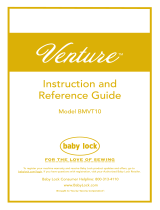7. The carriage will be positioned so that the beam of the W+
embroidery foot is very close to the center of the bottom
circle of the positioning sticker. Use the arrow keys
(shown to the left) to align the LED pointer with the
center of bottom circle of the embroidery positioning
sticker, and then press OK key. By calibrating the
position in this way, the embroidery pattern can be
precisely positioned.
8. Select the Edit key to display the editing window. Select
the Size key, adjust the design to the desired size, and
then press the OK key.
9. Select the Embroidery key in the lower right corner of
the screen.
10. Select the Layout key and then the positioning sticker
key.
Nine reference points appear in the screen: center, upper
left, upper center, upper right, left center, right center,
lower left, lower center, and lower right.
11. To position the design so that the design’s center
matches the embroidery positioning sticker, select the
Center key, and then press OK key. The embroidery
pattern will snap to the position and angle of the
embroidery positioning sticker.
You can use this same process for any of the other eight
reference points.
12. Check the design position on the fabric background. If
necessary, use the move and rotate tools to perfect the
design’s position.
13. Embroider the design to complete the process.




















